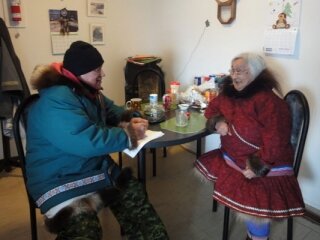
Over the past decade, it has increasingly become clear that climate change is having a significant impact on Canada’s northern environmental, social, and economic landscapes. Likewise, the health implications of melting sea and lake ice, melting glaciers, thawing permafrost, greater storm surges, unpredictable weather, shifts in animal migration patterns and plant ranges, shorter winter conditions, more forest fires, and hotter summers are of increasing concern to northern peoples.
Since 2008, Health Canada’s Climate Change and Health Adaptation Program’s participatory action approach has supported Northern First Nations and Inuit communities in meeting the challenges posed by climate change. The program has funded 36 community-led projects and sponsored capacity building workshops on health and adaptation research. In 2011, a workshop was organized that brought community researchers together for the first time to discuss their experiences, share their findings, and strategize for the future.
With the renewal of program funding in 2011, the need to continue these conversations while sustaining this emerging network has become overwhelming. Indeed, in an era where communication methods and technologies are rapidly changing and participatory knowledge creation becoming more broadly accepted, standard dissemination practices are becoming unproductive and costly. There is now a growing imperative for researchers to communicate their results using mediums that incorporate the most up to date and popular social media platforms to encourage maximal participation and involvement.
In response, the Institute for Circumpolar Health Research (ICHR) with the support of the Climate Change and Health Adaptation Program developed the Climate Telling web portal to provide that central communication hub for climate change and health-related issues in the Arctic. The portal intends to facilitate knowledge dissemination by accommodating multi-media research outputs (photo, audio, video) and stimulating dialogue through social media platforms universally used among youth. Moreover its hopes to encourage participation by providing a platform for discussion boards, personalized blogging, media uploads, and intranet-like file sharing.
While showcasing the various projects funded through the Climate Change and Health Adaptation Program, the portal aims to likewise highlight similar initiatives emerging from universities, non-governmental organizations, government agencies, and community themselves. The portal will also expand its focus to the circumpolar world where international cooperation and knowledge sharing can facilitate new ideas and better outcomes.
